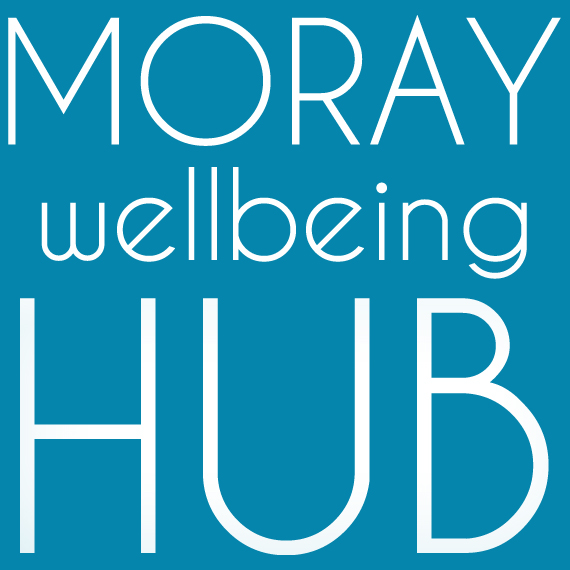One of our key aims at the Moray Wellbeing Hub is to help inspire and support people get more from their lives. Those who are experiencing a crisis in their mental health are never far from our thoughts, their acute pain and suffering reminds us all that problems in our mental health can have devastating effects.
Often this is a time when people experience a disconnection – from self, community and those they love. At the hub we want to provide hope in crisis and raise awareness that recovery, the ability to live a full life despite symptoms of mental health issues, is possible and likely.
One of the ways we are keen to do this is to engage with those in crisis wherever they are in Moray. Ward 4 is the mental health ward at Dr Gray’s hospital and is where people who require acute support receive intensive support. As part of our work to connect with services we were invited to visit the ward and chat with the patients and staff about our work.
Three champions attended who had their own experiences of mental health services in the past. The aim was to promote a peer connection, be friendly and open to those in destress and those who support them, the plan was that in doing this we might be able to sow a seed for the future regarding hope for change and wellbeing, as well as let people know they can use our services or become a champion themselves.
Below are some reflections from the champions attending about how the visit went, how it affected them and their hopes for next steps working with the ward staff and patients.
Matt:
Three years ago, I spent a month as a patient on Ward 4—the mental health ward—at Dr Gray’s Hospital in Elgin. This week, I returned as a “Champion” of the Moray Wellbeing Hub, an organisation which challenges the stigma around mental health.
I was happy to be there, partly because of the respect I was shown for my ideas on peace, which I had outlined in a letter I’d written to the United Nations. I wanted to thank the staff for their support and for allowing me to think freely.
I know that not all people are as lucky as me. Many have different thoughts which have led them to hurt themselves or others. It is easy to say that we must take responsibility for what we do, but the brain is complicated and it’s not always easy. Yet I believe that love, hope and peace are the three most important keys for positive, community life.
Michael:
Recently I had the privilege of visiting Ward 4 at Dr Gray’s Hospital in Elgin to talk about the support offered by the Moray Wellbeing Hub. For those unfamiliar with Ward 4, it is the Mental Health ward providing psychiatric nursing and care for up to 20 patients.
Having spent many years in the counselling field, I am used to working with people with mental health issues; yet sitting in Ward 4 made me a little apprehensive. I was reminded of a challenging time I’d had as a patient in a mental health clinic in England nearly 20 years earlier, when I was treated for severe depression and anxiety. And, during my childhood, I had visited my father in a psychiatric hospital where he was being treated. I recalled my boyhood bewilderment at the hospital’s strange inmates and the sounds of wailing and shouting beyond the visitors’ room. But my apprehensions soon evaporated at the smiles and interest shown by the small group of patients and nurses who came to listen and chat with us.
One chap asked us if were from a Church. No, we replied, although churches do good work, we were simply ordinary folk who had, like him, had cause to use mental health services at one time or another. We knew something of what it was like to be struggling emotionally and were acquainted with the stigma around mental health. Heidi shared a comprehensive background to the Moray Wellbeing Hub and the support it offered through a variety of courses, trainings, and resources. Our message was to reassure patients that you need not feel isolated and unsupported when you left Ward 4 – there were others like us who could offer support, compassion, and understanding. The nurses also took a keen interest in what we had to offer, another important community resource to which they could refer their patients.
Once the information was shared, we engaged in friendly banter, sharing of ideas, and personal stories. I felt that we made a connection, albeit to a small group, but an important connection nonetheless. Both the nurses commented that they would be open to members of the Hub returning, particularly those who could offer activities that encouraged listening and participation. This felt to me a welcoming gesture which the Hub could explore further.
That afternoon on Ward 4 reminded me of the importance of relationships and connections and how together we can overcome the prejudices and biases that stigmatise those with mental health challenges. By sitting with one another, engaging in conversation and deep listening, by sharing our stories and opening our hearts to one another, we can overcome those challenges and create a more positive and healthy culture where we all thrive together. For me, that is what the Moray Wellbeing Hub is all about.
Heidi:
When the invitation to visit ward 4 arrived in my email I was delighted, but also very apprehensive. For me going in to the building is a trigger to a time I was my most unwell in terms of my mental health, a time I felt powerless and overwhelmed with fear. Although I frequently am open about my challenges in mental health, this is still an area of my past I find painful and emotive.
However, the great thing about being a champion is that I knew I would not be doing this alone and that there would be others who could come along with me to share hope and hear the voices of those patients currently in crisis. Ultimately, such a visit is about those we can reach and I knew that the positives would outweigh any negative impact on my on wellbeing. I also hoped to challenge my own stigma about the building and build a new relationship with it and those who work there.
Michael and Matt could not have been a better choice for fellow team members, they both are very open to different viewpoints and compassionate. I shared my anxieties with them as we met up before the visit and they reassured me simply by listening and understanding, both the excitement of an opportunity to share our work with a new audience and the negative pull of my own experiences.
Matt is very open about the positive effect of his stay at the ward in the past, as many other are, but for others any stay in a mental health ward is something they dread. The stigma is very powerful in terms of the effect it can have to limit lives, but it is also the lack of control that is feared – the fact that another human, a medical professional, can take choice away under a section, is something many of the population fear – much of this based on misunderstanding linked to popular media. This in turn creates a stigma on the medical services that is also hugely damaging, for staff and for those in need of support.
The services currently available on the NHS may not suit us all, but they are there as an important choice for some and for many a safety net to save lives, just as the wider services focused on physical health. Equally as citizens we need to engage to help them develop as services, celebrate good practice and campaign for greater resources.
Therefore, I was very pleased that our visit not only included talking with four patients, but also two staff members. The Moray Wellbeing Hub is not a service user organisation in the traditional sense, and it is important that staff get to know that we are interested in their voices as community members as well.
I felt the visit was successful in sharing our message that the hub exists, that champions are peers and compassionate, that change is possible, and that we are keen to explore what more we can do for the ward patients, staff and others.
The next step for me is to explore if we might be able to visit the ward regularly, as I know the likes of HUG Action For Mental Health and other peer-led groups do in other areas of Scotland, to become another recovery support for those in crisis and to help them share their voice in creating change to improve mental health in Moray and wider. The Moray Wellbeing Hub’s collective of champions work as a collective voice in wellbeing for Moray and we want to do more to help change happen based on what people say works for them.
On behalf of the champions, I would like to thank the patients, staff and those who organised the visit. I look forward to the next time!
If you have thoughts or ideas that you want to share as a result of reading this reflection, please get in touch with us.






